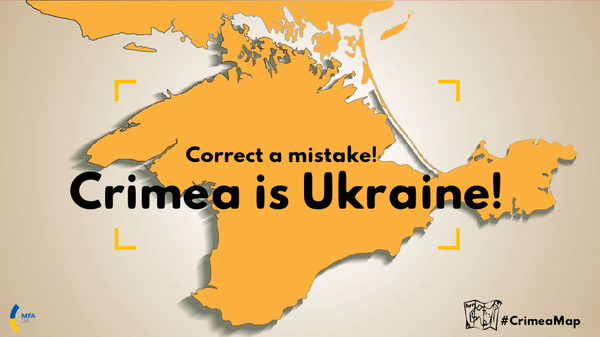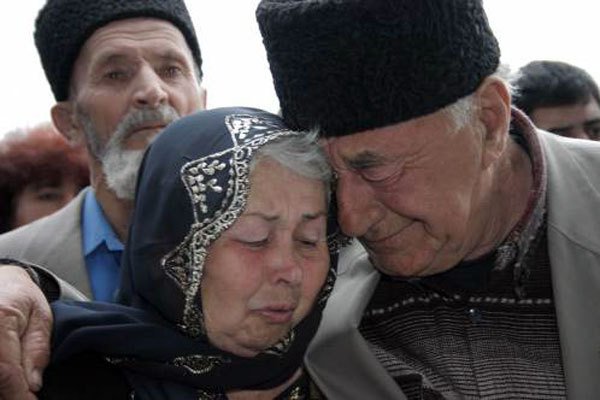18 December 2015. Auf Deutsch
Throughout ongoing discussions over whether to extend EU sanctions against the Russian Federation, many people wonder whether the sanctions are actually effective.
There can be no doubt that low oil prices have hurt Russia’s economy. But many people are asking whether the Russian economy has also been affected by EU sanctions. And they’re also asking whether the sanctions include too many loopholes to be effective.
In any conflict it is good to have an ally, and even better to have several. Furthermore, allies need not consist exclusively of other governments. Powerful allies can also consist of both domestic and multi-national corporations, commercial associations, political parties, and other non-governmental organizations. For Russia to navigate conflicts with Europe in general and Ukraine in particular, it has actively cultivated such allies over a significant period of time. Recall that five European companies have chosen to collaborate with Gazprom in the "North Stream-2" project. These companies all originated from the countries which most consistently exhibit an interest in reviewing their sanctions policies against Russia - Germany, Austria and France.
One of the basic strategies for bypassing sanctions can be illustrated by the example of Siemens, a German company. Siemens’ operations in Russia have drawn the attention of media analysts at ZN.UA, a Ukrainian website.
During the summer of 2015, media attention began to focus on the prospect of Siemens supplying gas turbines to Crimea (frequently referred to as the “Crimean Autonomous Republic” since being annexed by Russia) to increase electricity production. Official representatives of the German company denied this assertion, claiming to respect “the requirements of the sanctions and to further compliance with the provisions of the sanctions."
Read more: Siemens set to violate sanctions regime, helping build power stations in Crimea
But this whole situation deserves a closer look.
The foundation of Russian-German cooperation in high-tech power engineering was laid many years ago. In 2007 and 2008, Siemens negotiated contracts with a St. Petersburg company, Power Machines
, providing for the transfer of German technology and the right to manufacture gas turbines. The contracts each had a term of 20 years, expiring in 2027 and 2028, respectively. In addition, at the end of 2008 a strategic agreement on cooperation and partnership was entered into between Siemens and the newly formed Russian state corporation, Rostec. This happened shortly after the Russian military actions against Georgia.
Rostec, a state-controlled corporation, was created in November, 2007 to facilitate the development, production and export of high-tech industrial products. Rostec is regarded as a Russian monopoly in the fields of military and industrial technologies and in dual-use goods and was formed to promote public policy for Russia’s industrial development and modernization. This mega-corporation encompasses such giant concerns as "Kalashnikov", "Helicopters of Russia", "The United Engine Building Corporation" and others. In short, Rostec, within the defense and high tech industries, is similar to Gazprom and Rosneft in the energy sector.
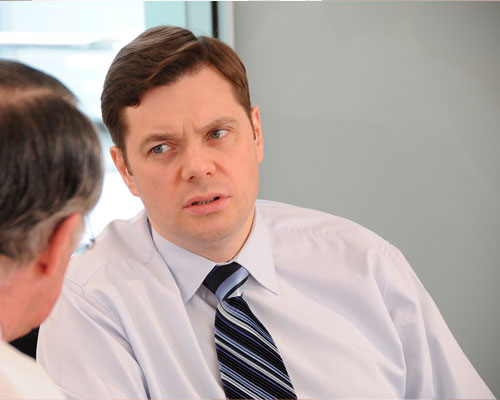
Both Rostek and Siemens wanted to acquire Power Machines. But the eventual winner of the competition was a close friend of Vladimir Putin, billionaire Alexei Mordashov. Today 100% of Power Machines is owned by a Cyprus Company Highstat limited. According to its annual report, the single shareholder of the Power Machines is the company HIGHSTAT LIMITED. The controlling interest in HIGHSTAT LIMITED is owned by Alexei Mordashov. [...]
In 2009, a scandal broke out involving a subsidiary of Siemens in Russia. There were allegations of corrupt practices, specifically bribery of government officials at various levels, to win contracts. As a result, the company was excluded from bidding on public contracts for four years. Deutsche Welle estimated that the total amount of Siemens’ "black" funds spent from 2000 to 2009 was nearly 1.3 billion euros. It thus appears that Russian-German business relations have historically been based on the so-called principle of “pragmatism,” usually typified by hidden commissions, kickbacks and other elegantly disguised forms of corruption. The “Schroeder effect" is a manifestation of Russian-German relations at the crossroads of big business and politics.
In December 2011, after a failed attempt by Siemens to take over a controlling stake in Power Machines, the two companies formed a joint venture, Siemens Gas Turbines Technology (STGT), with shares divided 65% to Siemens and 35% to Power Machines. As a result, as of 18 June 2015, a plant near St. Petersburg had already been placed into operation for the assembly and servicing of gas turbine units. Power Machines’ annual report for 2014 stated: "The development of the gas turbine business of Power Machines is conducted in close partnership with Siemens. The Russian-German joint venture is engaged in research and development of new gas turbines, the localization of production in Russia, assembling, sales, project management and maintenance of gas turbines.”
In 2014 Rostec tried to gain control of Power Machines, but Mordashov, thanks to connections at the top of Russia’s centers of power, managed to maintain control.
Power for occupied Crimea
It appears that Siemens’ gas turbines, primarily the SGT5-2000E, can be used to help solve the issue of power generation on the Crimean peninsula. The SGT5-2000E has established itself as a reliable unit for generating capacity. It is widely used in both simple and combined cycles. The power of this gas turbine in a combined cycle is 253 megawatts in a single-shaft version and 512 MW in a double-shaft version. Its efficiency reaches 52.5 and 53.1%, respectively. It has good resistance and durability. An additional advantage of this model is the wide range of fuel it can use - from natural gas to heavy oil and crude oil. Natural gas, of course, is the best option.
Read more: Can Russia completely supply Crimea with power? Four facts to make your own conclusions
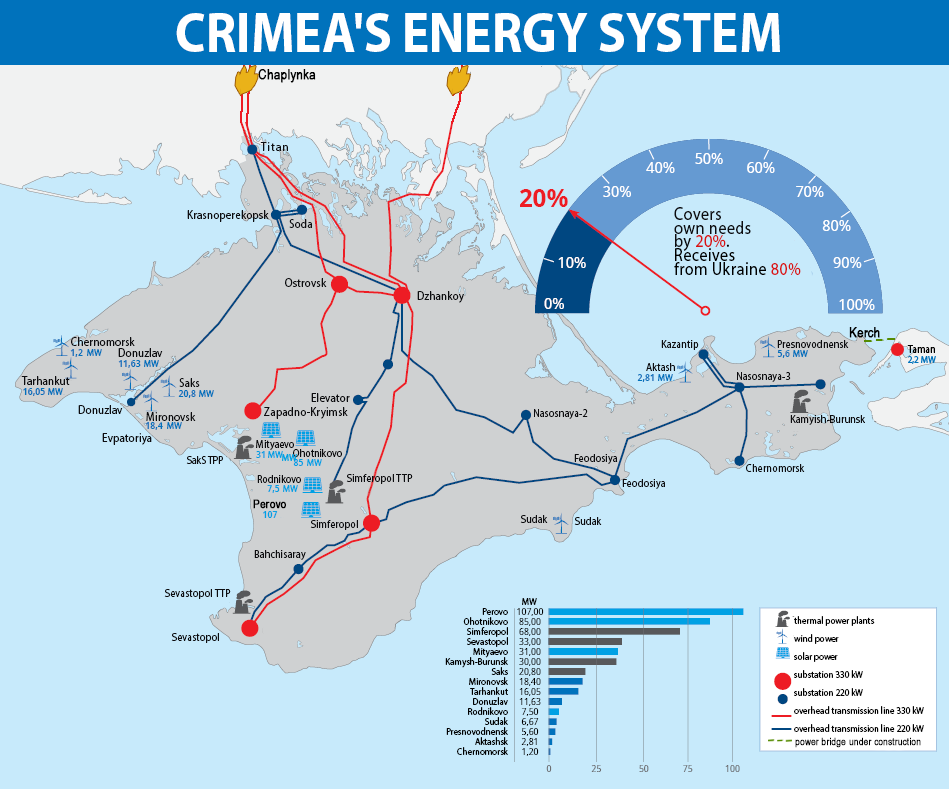
According to certain official “information on the development and current state of the fuel and energy complex of the Republic of Crimea in 2014," the highest priority is energy supply to the major cities on the Crimean Peninsula, especially Simferopol and Sevastopol. Therefore, measures are being taken to increase gas production by the so-called SUE RC Chernomorneftegaz (formerly a subsidiary of NJSC ‘Naftogaz of Ukraine”, Chernomorneftegaz) at the Odesa - Arkhangelsk gas fields and the Storm gas condensate field. Gas is thought to become a major source for the production of electricity on the peninsula. There are also plans to complete a gas pipeline from Russia through the Kerch Strait, a project of special interest to both Gazprom and Power Machines (with Siemens’ involvement), because there is a high likelihood that their gas turbine equipment will be ordered by the Russian gas monopoly.
Read more: Siemens to help provide forbidden power to Crimea
For the development of infrastructure in the Crimean Federal District, a standard bidding procedure has been used, where the winner is appointed in advance. In the summer of 2014, the engineering company Tekhnopromexport, a part of the corporate empire of Rostec, was selected as the prime contractor for the construction of new power units in Simferopol and Sevastopol.
According to the procurement schedule of Tekhnopromexport, almost 4.2 billion rubles (about $ 62 million) was allocated in 2015 to purchasing combined cycle gas turbines (CCGT) together with generators and auxiliary equipment for Crimea’s needs. The final destination of the equipment appears to be Simferopol and Sevastopol. This follows from decision №2004-r dated October 8, 2015, of the Russian government in furtherance of Government Decree №803 dated 14 August 2014.
In August 2015, biddings were announced by Tekhnopromexport for the supply of turbines, generators and auxiliary equipment for four power stations with a capacity of 235 megawatts (corresponding precisely with the nameplate capacity of the Siemens SGT5-2000E). Taman, where a powerful thermal power plant was supposed to be built, not Crimea, was identified as the proposed destination for this new supply of gas. In July 2015, Thomson Reuters, in response to a request made to Siemens, received the following message: "Siemens has no reason to doubt that the gas turbines under the contract will be for a different region rather than for the power plant in Taman.”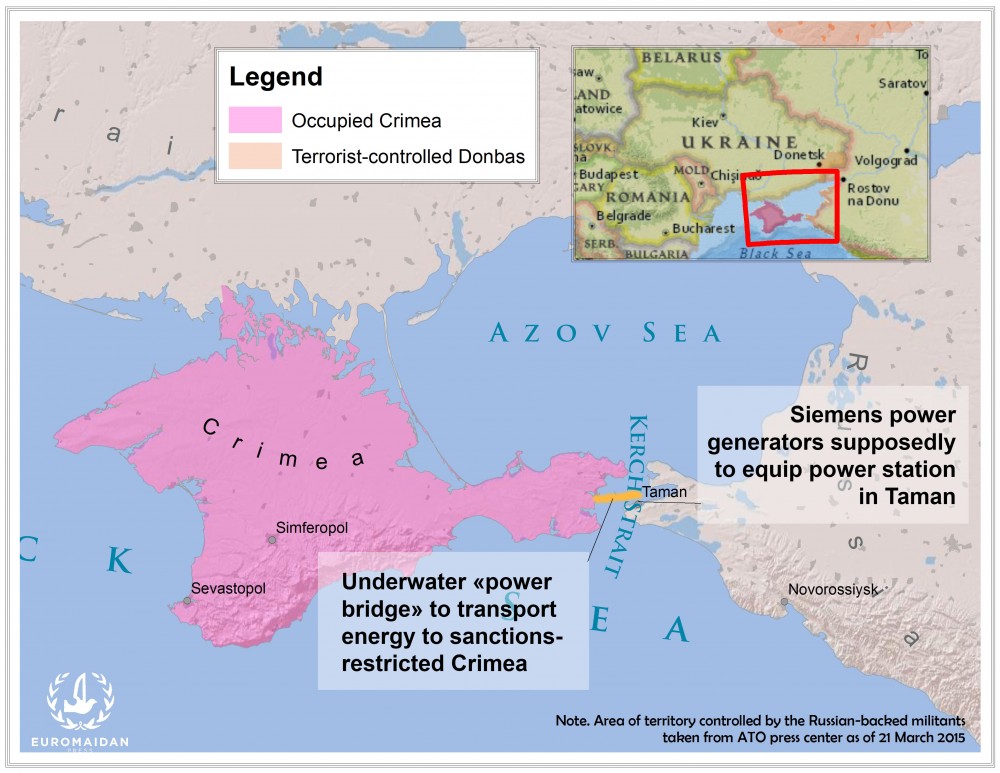
Even the Russian media raised questions about locating a thermal power plant in Taman and about the identity of the corresponding investor. But no information was made available on the location of the construction site, the technical feasibility of the project, or the bidding for the project. The only information divulged by the Russian Energy Ministry was that the plant would be erected near the Kerch Strait. No precise location was identified. In comparison, the specific location of a Thermal Power Plant commissioned in 2004 for the same Southern Federal District was included in a list compiled three years previously by the Federal Energy Commission of the Russian Federation of priority capital construction projects.
Of course, a thermal power plant in Taman could theoretically have been planned because southern Russia is also facing an energy shortage. Moreover, extending cables across the Kerch Strait will certainly make it possible to transfer some power from Taman to Crimea. But there are two problems with this hypothesis. First, the government of the Russian Federation only allows the construction of generating capacities in Crimea and the Kaliningrad region. Second, Crimean media reports have stated that, "The Sevastopol TPP will consist of two units. The first unit, with a capacity of 235 MW, will be put into operation in September 2017, and the second by March 2018. The new station will operate on Siemens gas turbines, manufactured through a joint venture in St. Petersburg. The choice of this equipment is due to the sanctions regime, which disallows the use of American or German power-generating equipment, and to the very good reputation this equipment achieved at the Olympic Games in Sochi.”
Apparently, Moscow believes that sanctions can be circumvented because the manufacturer of the gas turbines is a joint venture where one of the participants is a Russian private entity or individual (Mordashov), rather than the Russian government. It could also be noted that the joint venture is registered and located in the in the North-West Federal District of the Russian Federation and the new thermal power plant is also on the territory of the Russian Federation, in Taman, in the Southern Federal District. If the plant were to be relocated to somewhere else, such as the Crimean Federal District, that would be a decision of the customer and the new plant’s contractor, who again are Russian companies--Rostec and Tekhnopromexport , being parent and subsidiary companies. So perhaps an argument could be made that Siemens is not supplying anything to Crimea or Taman, either directly or indirectly through its joint venture, STGT. Its customer is Power Machines, the engineering company. Tekhnopromexport transparently lost the contract to the joint venture.
Meanwhile, according to Russian media reports, the first two Siemens’ turbines will be assembled by the end of 2015 by STGT in the industrial zone of Gorelovo.

It should be recalled that, on 26 March 2014, 10 days after the "Crimean referendum," the head of Siemens, Joe Kaeser, arrived in Moscow to meet with Vladimir Putin. After the meeting, Mr. Kaeser said that "short-term turbulence and instability in the relations between Moscow and Berlin will not affect the long-term plans of his group, and Siemens will continue to evolve its production capacity in Russia, as well as work with Russian companies." Even German Vice-Chancellor Sigmar Gabriel, well known for his pro-Russian orientation, condemned the visit: "We should not give the impression that Europe will trade its values, and a clear stance on the inviolability of its borders, like a bag of pepper."
Joe Kaeser then modified his behavior, and in the summer of 2015 did not attend the traditional economic forum in St. Petersburg. This time his remarks were a better fit politically: "We recognize the primacy of politics. We comply with the rules, and I have always clearly stated that.” What is clear is that Mr. Kaeser’s politically correct statements do not mask his company’s interest in the Russian marketplace. By the way, Siemens, like some other German companies, is no fan of Chancellor Merkel. They are waiting for upcoming elections—and they do more than simply wait, they are actively working to change their country’s current direction.
Business has its own parallel foreign policy
Attention must be paid to both the formal and informal visits to Russia by German government officials and parliamentarians. For example, visits to Moscow have been made by Vice Chancellor Sigmar Gabriel, as well as a delegation of the Bundestag, led by Peter Ramsauer, a member of the Committee on Energy and the Economy. These visits gave the appearance of double-dealing by the German government and appropriately created an uproar in the Bundestag.
Dieter Janecek, a Bundestag deputy from the party Alliance 90/ The Greens stated: "Part of the federal government is trying to pursue a Russian foreign policy aimed at strengthening economic ties and eventually the lifting of sanctions imposed by the European Union against Russia after the annexation of Crimea." He named his approach Nebenaußenpolitik - parallel (additional, adjacent) foreign policy. It is based on modern principles of "business as usual" (Nur geschäft) or, as known since Roman times, "money does not smell"...
Moreover, this”parallel policy” approach has been adopted not only by the corporate sector, but also by authoritative think tanks such as the SWP - German Foundation for Science and Politics, which, incidentally, is the principal adviser to the Government of Germany on matters of foreign and international politics. It is alleged that this parallel foreign policy is workable-- sanctions are not pervasive, and apply only to individuals and businesses. What then shall the German government do if business and the think tanks say that a parallel policy works?
It is clear that the Russian side is actively considering Nebenaußenpolitik, and is unlikely to comply with the Minsk agreement, because they know that the real interest of their German partners is not forcing Russia to adhere to the provisions of the CSCE Helsinki Final Act of 1975, nor the restoration of the territorial integrity of Ukraine and the withdrawal of Russian occupation forces from Crimea and Donbas, but in obtaining a cash flow from Russia in exchange for the high-tech products needed by the Kremlin.
According to a German proverb, everything has its end, and only the sausage has two ends. The Germans figured out how to have a "Crimean sausage" on orders from both ends - German and Russian. If a direct supply of equipment and technologies by Siemens is not an option, then they can go over to the Russian side and grab their share there. It’s worth mentioning that Siemens beat out a number of Russian manufacturers of similar products such as Perm Motors, Kuznetsov Samara NTC, Rybinsk Motors, and LMZ. And the Crimean orders are only the beginning. The "North Stream-2" is on the way; the head of Siemens already visited Gazprom in September to talk about future prospects, as has happened before. [...]
If Ukraine’s president and government continue to take a merely contemplative stance to these affairs, European sanctions will remain in place only on paper, and leading companies will utilize alternative circuits to bypass the intended effects of EU sanctions. Further, Ukraine should consider discontinuing its current endeavors with Siemens, a company that conducts unfriendly policies toward Ukraine and promotes energy policies that assist annexationist Russia in consolidating its ill-gotten gains. Specifically, the Ukrainian government is currently trying to establish a strategic partnership with this company, by which Ukraine would upgrade its existing fleet of locomotives and trams. But Ukraine should bear in mind that here are alternatives, like the Czech company, Skoda, for example.
It is worth recalling an incident involving a Chinese vessel that was used to extend cable lines through the Kerch Strait to supply electricity to Crimea. If Ukraine would have issued the appropriate diplomatic warnings, and the ship, ignoring Ukrainian precautions, would have received an anti-ship missile in its hull, then there is no doubt that the Chinese and other potential contractors with the Kremlin would have given further thought to violating applicable sanctions. Then Ukraine would be respected. Türkiye’s forceful actions against Russia provide a useful example. For "hybrid partners,” a “hybrid policy" is needed.




